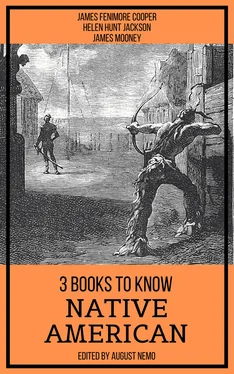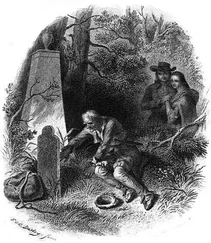“Why so soon disheartened!” he exclaimed; “the scoundrel must be concealed behind some of these trees, and may yet be secured. We are not safe while he goes at large.”
“Would you set a cloud to chase the wind?” returned the disappointed scout; “I heard the imp, brushing over the dry leaves, like a black snake, and blinking a glimpse of him, just over ag’in yon big pine, I pulled as it might be on the scent; but ‘twouldn’t do! and yet for a reasoning aim, if anybody but myself had touched the trigger, I should call it a quick sight; and I may be accounted to have experience in these matters, and one who ought to know. Look at this sumach; its leaves are red, though everybody knows the fruit is in the yellow blossom, in the month of July!”
“’Tis the blood of Le Subtil! he is hurt, and may yet fall!”
“No, no,” returned the scout, in decided disapprobation of this opinion, “I rubbed the bark off a limb, perhaps, but the creature leaped the longer for it. A rifle-bullet acts on a running animal, when it barks him, much the same as one of your spurs on a horse; that is, it quickens motion, and puts life into the flesh, instead of taking it away. But when it cuts the ragged hole, after a bound or two, there is, commonly, a stagnation of further leaping, be it Indian or be it deer!”
“We are four able bodies, to one wounded man!”
“Is life grievous to you?” interrupted the scout. “Yonder red devils would draw you within swing of the tomahawks of his comrades, before you were heated in the chase. It was an unthoughtful act in a man who has so often slept with the war-whoop ringing in the air, to let off his piece within sound of an ambushment! But then it was a natural temptation! ’twas very natural! Come, friends, let us move our station, and in such a fashion, too, as will throw the cunning of a Mingo on a wrong scent, or our scalps will be drying in the wind in front of Montcalm’s marquee, ag’in this hour to-morrow.”
This appalling declaration, which the scout uttered with the cool assurance of a man who fully comprehended, while he did not fear to face the danger, served to remind Heyward of the importance of the charge with which he himself had been intrusted. Glancing his eyes around, with a vain effort to pierce the gloom that was thickening beneath the leafy arches of the forest, he felt as if, cut off from human aid, his unresisting companions would soon lie at the entire mercy of those barbarous enemies, who, like beasts of prey, only waited till the gathering darkness might render their blows more fatally certain. His awakened imagination, deluded by the deceptive light, converted each waving bush, or the fragment of some fallen tree, into human forms, and twenty times he fancied he could distinguish the horrid visages of his lurking foes, peering from their hiding-places, in never-ceasing watchfulness of the movements of his party. Looking upward, he found that the thin fleecy clouds, which evening had painted on the blue sky, were already losing their faintest tints of rose-color, while the imbedded stream, which glided past the spot where he stood, was to be traced only by the dark boundary of its wooded banks.
“What is to be done?” he said, feeling the utter helplessness of doubt in such a pressing strait; “desert me not, for God’s sake! remain to defend those I escort, and freely name your own reward!”
His companions, who conversed apart in the language of their tribe, heeded not this sudden and earnest appeal. Though their dialogue was maintained in low and cautious sounds, but little above a whisper, Heyward, who now approached, could easily distinguish the earnest tones of the younger warrior from the more deliberate speeches of his seniors. It was evident that they debated on the propriety of some measure that nearly concerned the welfare of the travellers. Yielding to his powerful interest in the subject, and impatient of a delay that seemed fraught with so much additional danger, Heyward drew still nigher to the dusky group, with an intention of making his offers of compensation more definite, when the white man, motioning, with his hand, as if he conceded the disputed point, turned away, saying in a sort of soliloquy, and in the English tongue —
“Uncas is right! it would not be the act of men to leave such harmless things to their fate, even though it breaks up the harboring place forever. If you would save these tender blossoms from the fangs of the worst of serpents, gentleman, you have neither time to lose nor resolution to throw away!”
“How can such a wish be doubted! have I not already offered —”
“Offer your prayers to Him who can give us wisdom to circumvent the cunning of the devils who fill these woods,” calmly interrupted the scout, “but spare your offers of money, which neither you may live to realize, nor I to profit by. These Mohicans and I will do what man’s thoughts can invent, to keep such flowers, which, though so sweet, were never made for the wilderness, from harm, and that without hope of any other recompense but such as God always gives to upright dealings. First, you must promise two things, both in your own name and for your friends, or without serving you, we shall only injure ourselves!”
“Name them.”
“The one is, to be still as these sleeping woods, let what will happen; and the other is, to keep the place where we shall take you, forever a secret from all mortal men.”
“I will do my utmost to see both these conditions fulfilled.”
“Then follow, for we are losing moments that are as precious as the heart’s blood to a stricken deer!”
Heyward could distinguish the impatient gesture of the scout, through the increasing shadows of the evening, and he moved in his footsteps, swiftly, towards the place where he had left the remainder of his party. When they rejoined the expecting and anxious females, he briefly acquainted them with the conditions of their new guide, and with the necessity that existed for their hushing every apprehension, in instant and serious exertions. Although his alarming communication was not received without much secret terror by the listeners, his earnest and impressive manner, aided perhaps by the nature of the danger, succeeded in bracing their nerves to undergo some unlooked-for and unusual trial. Silently, and without a moment’s delay, they permitted him to assist them from their saddles, when they descended quickly to the water’s edge, where the scout had collected the rest of the party, more by the agency of expressive gestures than by any use of words.
“What to do with these dumb creatures!” muttered the white man, on whom the sole control of their future movements appeared to devolve; “it would be time lost to cut their throats, and cast them into the river; and to leave them here, would be to tell the Mingos that they have not far to seek to find their owners!”
“Then give them their bridles, and let them range the woods,” Heyward ventured to suggest.
“No; it would be better to mislead the imps, and make them believe they must equal a horse’s speed to run down their chase. Ay, ay, that will blind their fire-balls of eyes! Chingach — Hist? what stirs the bush?”
“The colt.”
“That colt, at least, must die,” muttered the scout, grasping the mane of the nimble beast, which easily eluded his hand; “Uncas, your arrows!”
“Hold!” exclaimed the proprietor of the condemned animal, aloud, without regard to the whispering tones used by the others; “spare the foal of Miriam! it is the comely offspring of a faithful dam, and would willingly injure naught.”
“When men struggle for the single life God has given them,” said the scout sternly, “even their own kind seem no more than the beasts of the wood. If you speak again, I shall leave you to the mercy of the Maquas! Draw to your arrow’s head, Uncas; we have no time for second blows.”
Читать дальше












